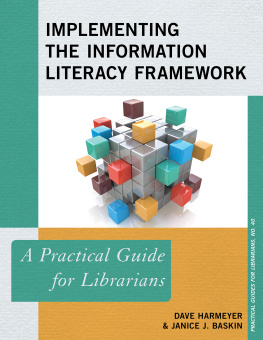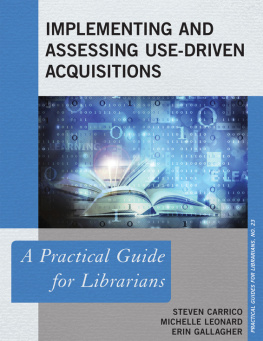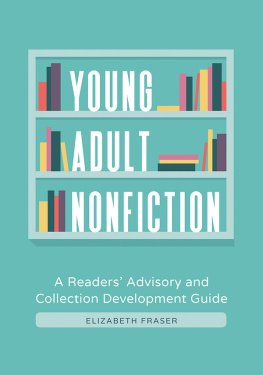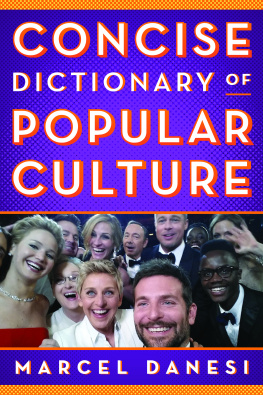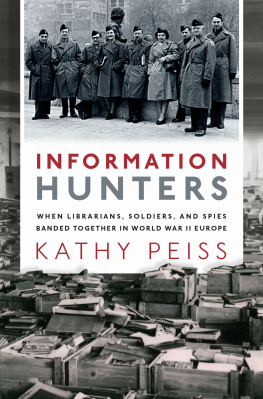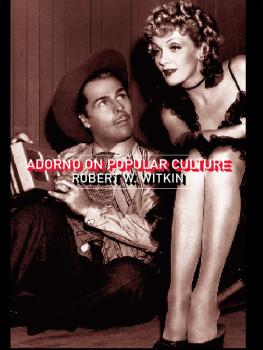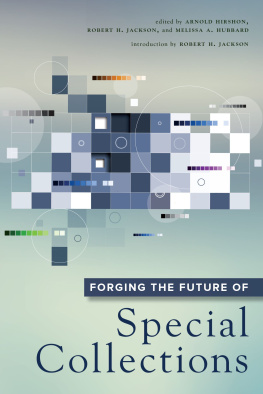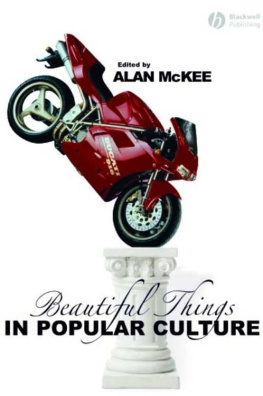Popular Culture and Acquisitions
Popular Culture
and Acquisitions
Allen Ellis
Editor
Popular Culture and Acquisitions has also been published as The Acquisitions Librarian, Number 8 1992.
1992 by The Haworlh Press, Inc. All rights reserved. No part of this work may be reproduced or utilized in any form or by any means, electronic or mechanical, including photocopying, micro- film and recording, or by any information storage and retrieval system, without permission in writing from the publisher.
First published 1992 by
The Haworth Press, Inc., 10 Alice Street, Binghamton, NY 13904-1580
This edition published 2013 by Routledge
711 Third Avenue, New York, NY 10017
2 Park Square, Milton Park, Abingdon, Oxon OX14 4RN
Routledge is an imprint of the Taylor & Francis Group, an informa business
Library of Congress Cataloging-in-Publication Data
Popular culture and acquisitions / Allen Ellis, editor.
p. cm.
Popular culture and acquisitions has also been published as The acquisitions librarian, number 8 1992.
Includes bibliographical references.
ISBN 1-56024-299-X (alk. paper)
1. LibrariesSpecial collectionsPopular literature. 2. LibrariesSpecial collectionsPopular culture. 3. Popular literatureBibliographyMethodology. 4. Popular cultureBibliographyMethodology. 5. Acquisitions (Libraries) I. Ellis, Allen
Z688.P64P67 1992
025.2-dc20 |
92-17522
CIP |
Dedicated
to the memory of
Brenda McCallum
1948-1992
Head Librarian
Popular Culture Library
Bowling Green State University
1986-1992
Popular Culture and Acquisitions
CONTENTS
Allen Ellis
Barbara B. Moran
Lucy Shelton Caswell
Nena Couch
William E. Jarvis
Gillian M. McCombs
Doug Highsmith
Gina R. Overcash
William L. Schurk
Nancy L. Buchanan
Rebecca Sturm Kelm
B. Lee Cooper
ABOUT THE EDITOR
Allen Ellis, MLS, is Associate Professor of Library Services at the W. Frank Steely Library of Northern Kentucky University in Highland Heights. He is Area Chair of thePopular Culture Association's Libraries and Popular Culture division and founder and former Chair of the Association of College and Research Libraries' Popular Culture and Libraries Discussion Group. Mr. Ellis serves on the editorial board of the journal Popular Culture in Libraries.
Allen Ellis
It has been nearly thirty years since Ray B. Browne and others began kicking academia in its complacent derriere, resulting in, among other things, the Popular Culture Association, and a continually growing interest in and demand for popular culture research materials. In the same time, Everyday America has seen the line between high and low culture endure a similar kicking-enough so that many types of materials and their content are much more critically and socially acceptable (comic books and rock music, as examples). It has been nearly twenty years since the library literature began to warn the profession that it had not done and was not doing its job in providing the information needs of an emerging and rapidly growing clientele.
It seemed that the warnings, suggestions, and calls-to-action of Jack A. Clarke, Gordon Stevenson, Wayne Wiegand, B. Lee Cooper, William Schurk, Barbara Moran, and others (all well documented in the following articles) were falling on the ears of a profession which cared little (or less) about supplying materials it had traditionally regarded (if at all) as trash. There were, of course, treasure troves such as the legendary Popular Culture Library at Bowling Green State University, and a smattering of such items in collections here and there, but as a whole, libraries and popular culture went together like Pepsi and Lucky Charms.
Recent years, however, have seen the emergence of practicing librarians who recognize their responsibilities and have begun making inroads to the consciousness of the profession. Popular culture programs in professional conferences and the establishment of the ACRL Discussion Group on Popular Culture and Libraries (eleven members of which contributed to this volume), the Consortium of Popular Culture Collections in the Midwest, and the new Haworth Press publication, Popular Culture in Libraries, attest to the fact that librarians did indeed hear the words of Clarke, Stevenson et al., and were putting their interests and talents to work.
There are many problems to be considered when dealing with Popular Culture and libraries, as emphasized by Barbara Moran's general overview, and the succeeding articles address some of these problems: dealing with donors, resource sharing, what to collect, for whom, and for what purposes, the importance of collection development policies. The treatments of specific types of materials, such as children's series books, comic books, mystery and detective fiction, popular recordings, romance novels, and tabloids, address problems common to all popular culture materials, including the establishment of legitimacy, competition with collectors and fans, dealing with the sheer vastness of materials available, locating obscure acquisition or review sources, and problems of budgets, storage, and preservation.
There is still much to be done to educate the library profession about the importance of collecting popular culture-witness Doug Highsmith's anecdote of the author who couldn't find a library to accept his research collection. Consider too the efforts of the Library Professions's quest for dignity, coupled with the prevalence of Pencilneck Journalism and its concomitant propensity toward articles of the ZapI Pow! Comic Books in the Library?!! ilk. One day there will be no reason for special volumes devoted to popular culture, for all library materials will come together, an equitable whole, cradled in the soothing arms of the Library Bill of Rights. Until then, pass the Pepsi and Lucky Charms, as librarians such as this volume's estimable contributors do what they have to do.
Editor's Note: A special note of thanks to the noted popular culture scholar, B. Lee Cooper, who quickly answered my last-minute request for this volume's reference listing.
Barbara B. Moran
SUMMARY. Courses on popular culture topics are being taught on thousands of campuses and many scholars are doing research in this area. Because of unfamiliarity with popular materials, many academic librarians have been slow to respond to the needs of students and scholars working in this relatively new field of study. This article discusses some of the problems associated with the collection of popular materials by academic libraries and offers some suggestions on how to address these problems. In addition, the article provides reasons why libraries should begin to systematically collect popular culture materials despite the difficulties sometimes associated with such collection development.
One cheats oneself, as a human being, if one has respect only for the style of high culture.1
-Susan Sontag
There has long been an uneasy relationship between popular culture and libraries. Over a century ago public librarians were disputing whether novels should be included in public libraries. In most public libraries, however, despite the ongoing controversy between those who want to give the public what it wants (which often is popular material) and those who want to give them the classics, popular culture materials are found in all public libraries. Whether the material found there is representative enough of the expanse of popular culture could be disputed, but popular culture, or at least certain popular fiction genres, are accepted as appropriate for public library collections.




